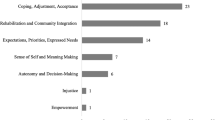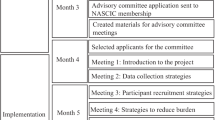Abstract
To ensure that research outcomes are relevant and meet the needs of the spinal cord jury (SCI) community, it is essential that people with lived experience of SCI (‘consumers’) are actively involved in all stages of the research process. One of the goals of the Spinal Research Institute (SRI) (www.thesri.org) is to facilitate this active engagement of consumers in research. In order to support consumer involvement, appropriate resources, including remuneration, need to be in place. This paper sets out the process undertaken by the SRI to develop a Policy for Consumer Remuneration. It addresses the rationale for creating a policy, the resources used and shares the model that defines the levels of consumer engagement and associated remuneration. The SRI Policy for Consumer Remuneration sets a standard for the SCI research field, which can serve as a model for Australia and as a template for other countries.
Similar content being viewed by others
The need for meaningful consumer involvement in spinal cord injury research
The Spinal Research Institute (SRI) is committed to a paradigm shift in spinal cord injury (SCI) research where people with lived experience of SCI (those who will consume, use and benefit from the research) play an active, collaborative role in research. This includes helping to develop research questions and co-designing protocols, through to involvement in data collection and analysis, and dissemination of research outcomes. By involving consumers as active partners throughout the research process—not only as study participants—the scope, quality, and outcomes of research will be strengthened and more beneficial to people living with SCI [1]. The Integrated Knowledge Translation (IKT) Guiding Principles for conducting and disseminating SCI research in partnership [2] provide guidance to support such meaningful partnerships.
Facilitating meaningful consumer involvement in spinal cord injury research
In 2019 the SRI established its Consumer Engagement Program to engage and involve people with lived experience of SCI in the research process. The program is developing resources to equip people with lived experience of SCI with the knowledge and skills needed to be active partners in research. To help ensure our program meets the needs of the SCI community we established a Consumer Advisory Network (CAN) to inform and guide its development. The SRI’s CAN currently comprises four people living with SCI, a family member who is also the primary carer for someone with SCI, and a clinical researcher active in the SCI field. The CAN is governed by a Terms of Reference, which details the roles, responsibilities, and expectations of both the SRI team and the CAN members in relation to the Consumer Engagement Program.
The input of the members of the CAN, who generously share their unique skills, expertise, and knowledge, is highly valued. At present, consumer remuneration is not mandatory in Australia and is not legally required or expected, however it is important to acknowledge the contribution of CAN members with appropriate remuneration.
Developing a policy for consumer remuneration
Remuneration with meaningful compensation is one method that can help mitigate tokenism and supports the IKT Guiding Principle that “partners recognise, value and share their diverse expertise and knowledge” [2]. In deciding to remunerate the consumer advisors, it was important to ensure that any remuneration did not impact on disability benefits or insurance payments that the CAN members may be receiving. As such, the SRI needed to develop a Policy for Consumer Remuneration to provide guidance on this matter within the organisation.
We investigated existing methods of consumer remuneration, policies and models that could be adapted for the SRI’s purposes. Useful resources were identified from: the Canadian Institutes of Health Research (CIHR) [3]; Patient-Centred Outcomes Research Institute (PCORI) [4] (USA); and South Australian Health [5]. Ultimately, a mature and suitably structured remuneration model from the Victorian Comprehensive Cancer Centre (VCCC), an alliance of ten leading research, academic and clinical institutions in Melbourne, Australia, was selected. Resources were leveraged from the open access VCCC consumer engagement toolkit [6], including their cost model and remuneration factsheets.
A review of Australian taxation and other financial implications determined that consumers be classified as ‘volunteers’ and paid in the form of an honorarium [7]. This is not considered salary or operating an enterprise and therefore is not taxable. It should be noted that CAN members are not eligible for remuneration if their involvement in the CAN is connected to their incoming-producing activities. If they wish to donate their time, consumers also have the option to choose not to receive financial recognition for their involvement with the CAN.
The SRI policy for consumer remuneration
The SRI Policy for Consumer Remuneration encompasses guidance for payment of remuneration and expense reimbursement, requirements for recording consumer participation in the program, the different levels of remuneration (the ‘remuneration model’), and information required by the Australian Taxation Office (ATO). In particular, there is a form that is submitted to the ATO [8], which declares that participation in the CAN is performed as a private recreational pursuit or hobby i.e., it is not connected to income producing activity and therefore is not taxable.
The consumer remuneration model is built on five levels of engagement—informing, consulting, involving, partnership and consumer-led. Remuneration depends on the level of engagement and associated activity, and there is a defined cost schedule for each tier of participation to maintain consistency across SRI projects and programs. CAN activities are classed as ‘partnership’ level. Remuneration can take the form of sitting fees for committee membership or an hourly rate, depending on the level of participation. As part of the policy, reimbursement of eligible expenses is also available. The levels of remuneration are reviewed annually and adjusted as necessary. Table 1 shows the different levels of remuneration in the consumer remuneration model. The rate for the highest-level of engagement (‘consumer-led’) is based on those determined by Safer Care Victoria for their partnering in healthcare framework [9]. This is an initiative of the Victorian State Government and is used as the basis from which the other remuneration amounts are determined. Other amounts are apportioned for the comparative complexity of consumer contribution to align with the levels in the model.
A current limitation of the SRI policy is that it is applicable only for remunerating consumers in Australia, however the policy can be adapted and potentially used as a template for other countries.
The Policy for Consumer Remuneration:
-
Helps to provide guidance within the organisation and facilitates agreement.
-
Is adaptable—with remuneration clearly defined for five levels of engagement.
-
Creates consistency across the SRI’s programs and projects.
-
Demonstrates management and organisational commitment to both engagement and remuneration of people with lived experience of SCI. The SRI’s Policy for Consumer Remuneration was reviewed and signed off by the SRI Board.
-
Helps to mitigate tokenism by recognising and valuing the expertise and knowledge of the CAN [2].
-
Raises community expectations about people with disability, helping reinforce that they offer unique expertise and skills and that their knowledge and experience should be valued.
-
Sets a standard for the SCI research field and consumer organisations.
Conclusion
To establish people with lived experience of SCI as active partners in research, their valuable skills, expertise, and knowledge must be acknowledged appropriately and supported with resources, including remuneration. The SRI Policy for Consumer Remuneration sets a standard for this in the SCI research field and can serve as a model for Australia and as a template for other countries. The Policy for Consumer Remuneration is available for download from: https://www.thesri.org/wp-content/uploads/2022/12/SRI-Policy-for-Consumer-Remuneration-20Nov2022-CCBYSA40.docx.
Data availability
Data sharing not applicable to this article as no datasets were generated or analysed during the current study.
References
Anderson KD. Equitable partnerships between scientists and persons living with spinal cord injury will strengthen research scope, quality, and outcomes. Curr Opin Neurol. 2021;34:783–8.
Gainforth HL, Hoekstra F, McKay R, McBride CB, Sweet SN, Martin Ginis KA, et al. Integrated knowledge translation guiding principles for conducting and disseminating spinal cord injury research in partnership. Arch Phys Med Rehabil. 2021;102:656–63.
Canadian Institutes of Health Research. Considerations when paying patient partners in research. 2022. https://cihr-irsc.gc.ca/e/51466.html
Patient-Centered Outcomes Research Institute. A Framework for Financial Compensation for Patient Partners in Research. 2015. https://www.pcori.org/blog/framework-financial-compensation-patient-partners-research
Government of South Australia, SA Health. Consumer, carer and community engagement. 2022. https://www.sahealth.sa.gov.au/wps/wcm/connect/public+content/sa+health+internet/about+us/about+sa+health/consumer+carer+and+community+engagement
Victorian Comprehensive Cancer Centre Pty Ltd. What is the toolkit? 2022. https://vcccalliance.org.au/our-work/consumer-engagement/toolkit/
Australian Government, Australian Taxation Office. Honorariums. 2017. https://www.ato.gov.au/Non-profit/Types-of-Not-for-profit-workers/Not-for-profit-volunteers/Paying-volunteers/Honorariums/
Australian Government, Australian Taxation Office. Statement by a supplier not quoting an ABN. 2017. https://www.ato.gov.au/forms/statement-by-a-supplier-not-quoting-an-abn/
Safer Care Victoria. A guide to consumer remuneration. In: A guide to consumer remuneration. State of Victoria. 2022. https://www.safercare.vic.gov.au/sites/default/files/2019-01/A guide to consumer remuneration.pdf. Accessed 20 November 2022.
Acknowledgements
We thank the following people: Ms Emma Peleg and Associate Professor Doug Brown AM, Spinal Research Institute, Australia, for input during the policy development process, and reviewing and commenting on this article; Dr Linda Barclay, Spinal Research Institute, Australia, for reviewing and editing the manuscript; and Mr John Chernesky, Praxis Spinal Cord Institute, Canada, for providing a guiding hand as we launched our consumer engagement work in 2019/2020.
Funding
Funding for the SRI’s Consumer Engagement Program was provided by the Transport Accident Commission and IOOF Foundation.
Author information
Authors and Affiliations
Contributions
KH was responsible for seeking out and reviewing publicly available consumer remuneration resources, writing the policy document, and writing the manuscript. AV was responsible for seeking out and reviewing publicly available consumer remuneration resources, engaging with the VCCC, reviewing the policy document, and reviewing, editing, and commenting on the manuscript.
Corresponding author
Ethics declarations
Competing interests
The authors declare no competing interests.
Ethics approval
No animal or human participants were studied, therefore ethics approval was not applicable.
Additional information
Publisher’s note Springer Nature remains neutral with regard to jurisdictional claims in published maps and institutional affiliations.
Rights and permissions
Springer Nature or its licensor (e.g. a society or other partner) holds exclusive rights to this article under a publishing agreement with the author(s) or other rightsholder(s); author self-archiving of the accepted manuscript version of this article is solely governed by the terms of such publishing agreement and applicable law.
About this article
Cite this article
Hendry, K.L., Vecchio, A. Involving people with lived experience of spinal cord injury in research: a policy for consumer remuneration. Spinal Cord 61, 285–287 (2023). https://doi.org/10.1038/s41393-023-00888-0
Received:
Revised:
Accepted:
Published:
Issue Date:
DOI: https://doi.org/10.1038/s41393-023-00888-0



